Whether you are a first-time jobseeker or not, one of the employment requirements that you need to submit is the National Bureau of Investigation (NBI) clearance. It is somewhat of a hassle because aside from having a 12-month expiration, it is also a bit expensive for renewal (around 160 to 330) and you have to wait for a minimum of seven days when you are tagged with “hit.”
The NBI clearance certifies whether the hired applicant has a criminal record or none. It is crucial for employers, especially the industries involving security, finance, childcare, and government service, to know the history of the job seekers, assess potential risks, and make informed hiring decisions.
According to the PSA Help Line, “The NBI clearance is a vital document in the Philippines. It verifies your clean criminal record, making it a key requirement for employment, government applications, and other important transactions.”
Despite the legitimate reason why employers are requiring NBI clearance, those applicants with criminal records face unique challenges. This begs the question: does a past mistake permanently disqualify someone from gainful employment? How can applicants balance transparency with the opportunity for rehabilitation and a fresh start?
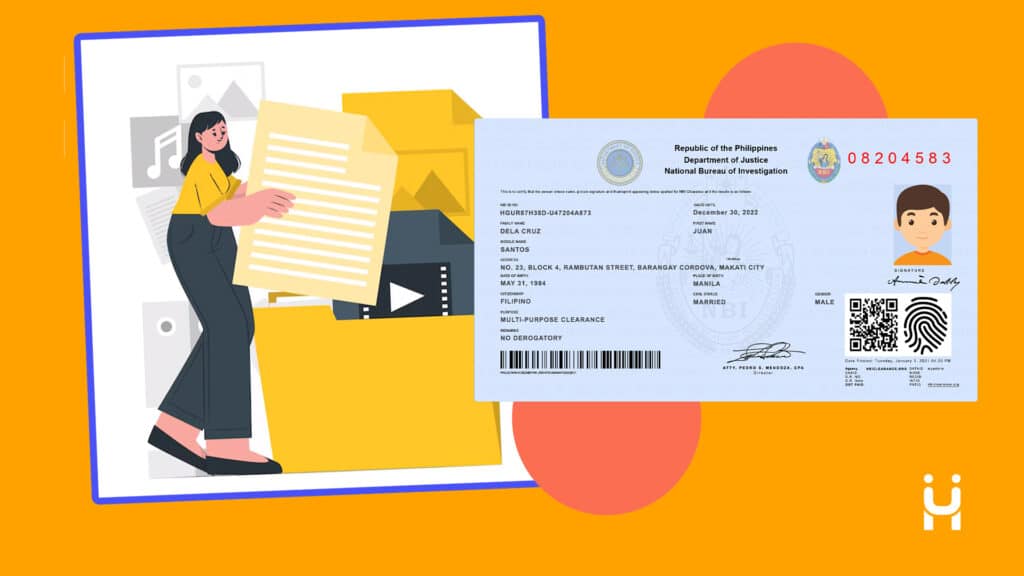
Is there a career hope outside the bar?
Disclosing to the employer about your criminal record can be complex both legally and psychologically. However, bear in mind that the Philippine law recognizes the importance of both public safety and the reintegration of individuals who have served their time. According to Respicio & Co. despite the Philippine law does not have a specific law that implies that you as a job applicant must disclose all your criminal convictions some laws are relevant to that issue:
Art III, Sec 1 and Sec 3: Right to Due Process and Right to Privacy. Every applicant has the right for fair consideration and to protect their reputation.
The employer should judge you based on your qualifications and how well you fit on the job, not simply on your criminal records. The past conviction, especially minor and not related to the job you are applying for, should not be the reason for your disqualification. For instance, you are applying for an accountant, but you committed a minor offense years ago. If your offense is not relevant to a position that doesn’t involve handling finances or sensitive information, then the employer must weigh the nature and gravity of the offense against the requirements of the job. It is called the principle of proportionality.
The law firm Respicio & Co emphasized that “ The Supreme Court of the Philippines has ruled that employees cannot be dismissed solely due to a past conviction unless it directly impacts their ability to perform the job duties.”
Moreover, the employer must be responsible for using your information and not spreading it around unnecessarily.
The job applicants with criminal records have the right to due process. You have the right to explain the circumstances surrounding your conviction. During interviews or with your cover letter, you must openly discuss your past honestly and the steps you have taken to rehabilitate yourself and become a productive member of society.
With your resume, you can also attach certificates of completion for relevant programs, letters of recommendation from community leaders, or proof of employment since the conviction, which can significantly strengthen their application.
Employers are obligated to assess every applicant fairly and legally. Banning job seekers with criminal histories is a form of discrimination.

If you believe, as an applicant, you have been discriminated against because of your criminal record, the Department of Labor and Employment (DOLE) is here to help you. It is the government agency that is responsible for labor and employment policies and programs.
According to Respicio & Co., although the Philippines does not have a “Ban the Box” law or policies and ordinances to discourage discrimination, the DOLE strictly advised that employers, during the pre-employment inquiries, should not ask personal questions not related to the job that may lead to discriminations and mat not step on their constitutional rights.
Respicio & Co also added that “ If an applicant can show that an employer rejected them purely based on a criminal conviction not relevant to the job, there may be grounds for contesting such rejection under existing labor jurisprudence, although success in such claims varies.”
Your Guide to NBI Clearance for First-Time Job Seekers
Here are the steps.
First. Open your browser and go to this link https://clearance.nbi.gov.ph to register for an account.
NBI Note: The difference between first-time job seekers and second-timers is in the payment, which is that the first-timer is free, and there is no question about YES or NO asking if you have NBI Clearance from 2014 to the present. Other than that, all the items are the same.
Second. Fill in all the details, then click Sign up.
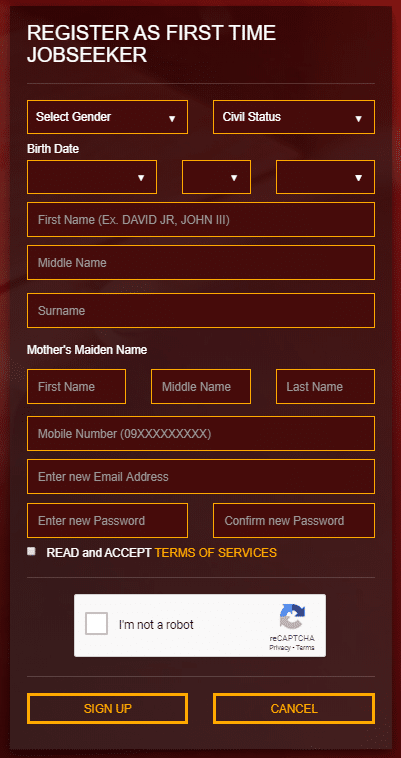
Third. You will receive an OTP (one-time password) after clicking the signup.
Note from NBI: Make sure to enter your NBI Online registration OTP within 5 minutes, or else it will expire, and it can not be used after 5 minutes. You will need to resend an OTP again if this will happen.
Fourth. Fill in the additional personal information. All with red asterisks are required to answer.
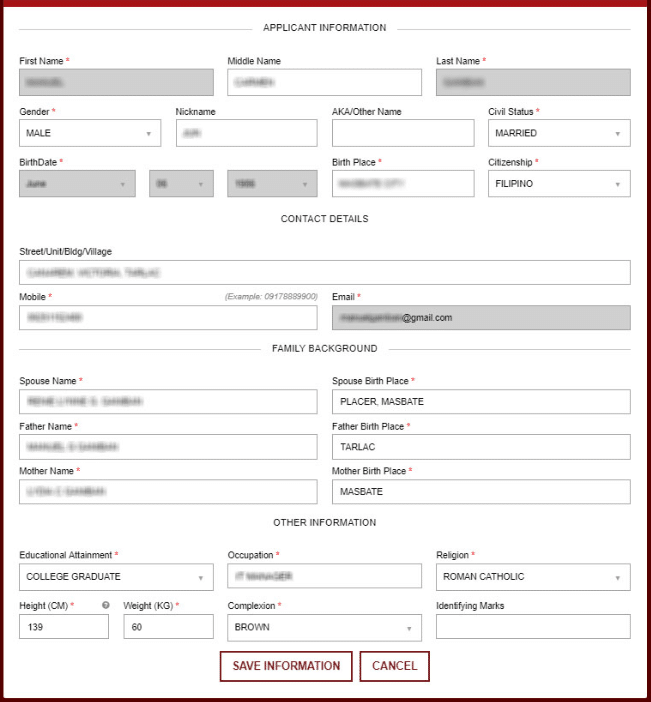
Fifth. Ready your valid IDs. Here is the list of IDs you can present to finish your registration.
- BIR/ TIN
- Certification from Malacañang in connection with Indigenous Groups and Tribal Membership
- Driver’s License
- DSWD Foundling
- IBP License Card
- Government Employee ID
- National ID
- Pag-Ibig ID/ Loyalty Card
- MARINA ID
- Passport
- PhilHealth ID
- Postal ID
- PRC License
- PSA Birth Certificate (AUTHENTICATED)
- PWD ID
- School ID together with Current Registration Card
- Seaman’s Book
- Security License ID
- Senior Citizen’s ID
- Solo Parent ID
- Unified ID (UMID)
- Voter’s ID or Certificate of Registration
Sixth. After selecting the valid ID, click “I Agree” to go to the Appointment Schedule.
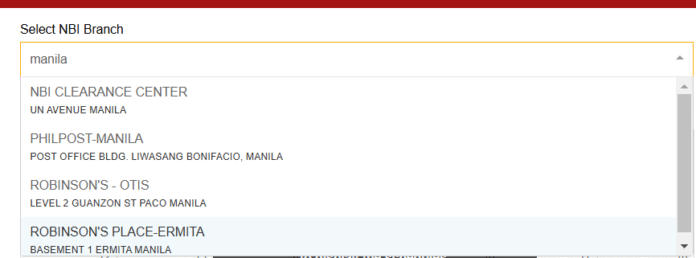
Seventh. Choose your appointment schedule, including the day, time, and branch location. NBI recommended choosing the branch location nearest to you.
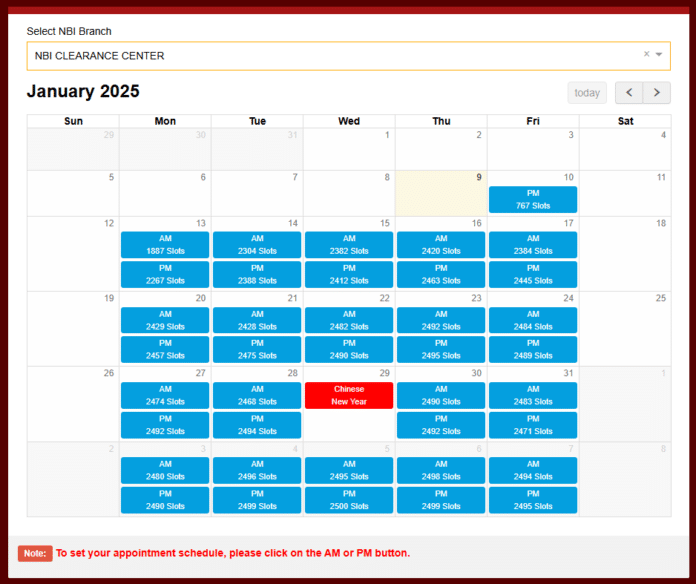
Eight. It is now time to pay. This is the last step of your registration. The NBI has a lot of options to pay your registration, such as Bank Over the Counter, Online Bank, Bayad Center Outlets, Bayad Center Mobile App, ECPay, and 7-Eleven.
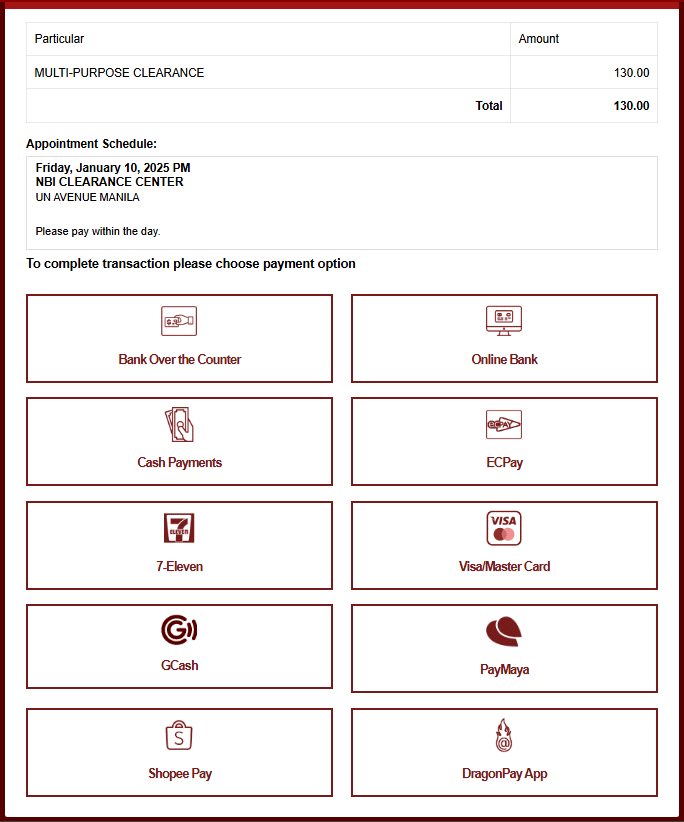
Nineth. To get your NBI clearance, you have to appear personally on the date and time at the branch you have chosen. Don’t forget to bring your 2 Valid IDs (Non-Government IDs and Barangay Clearance are not acceptable to process your NBI Clearance.) Choose a semi-formal Attire (Wearing Sando or sportswear is not allowed.) Most of all, don’t forget to bring your NBI Clearance Receipt as proof that you’ve paid the Clearance.
NBI Note: Upon arriving in the NBI Clearance office, it is better to ask the NBI Clearance personnel first before moving. The NBI personnel will give you the instructions on which window you’ll start.
Ready for Better Job Opportunities?
Now that you’ve completed your NBI Clearance application, it’s time to take the next step in your career. Download the Lahat Jobs app—your one-stop platform for discovering thousands of job openings in the Philippines. Whether you’re a fresh graduate, an experienced professional, or an OFW coming home, Lahat Jobs connects you to the right employers fast.
✅ Get hired quicker
✅ Apply with just a few taps
✅ Trusted by top companies nationwide
Don’t wait—download Lahat Jobs today and start your journey to better opportunities!

